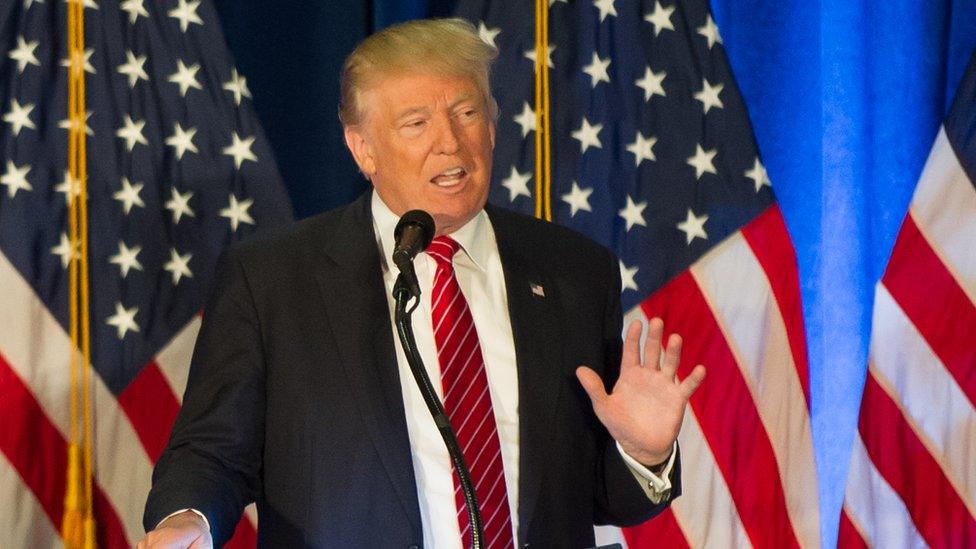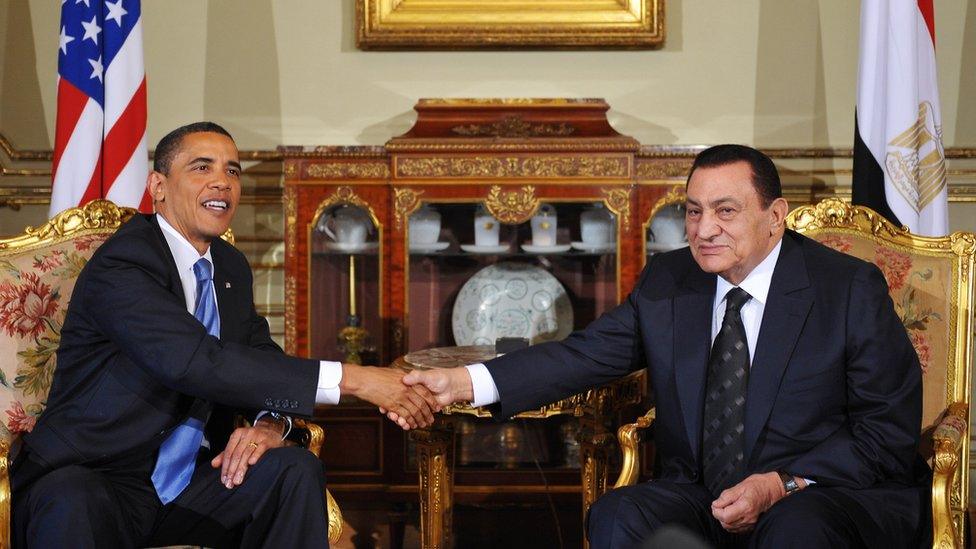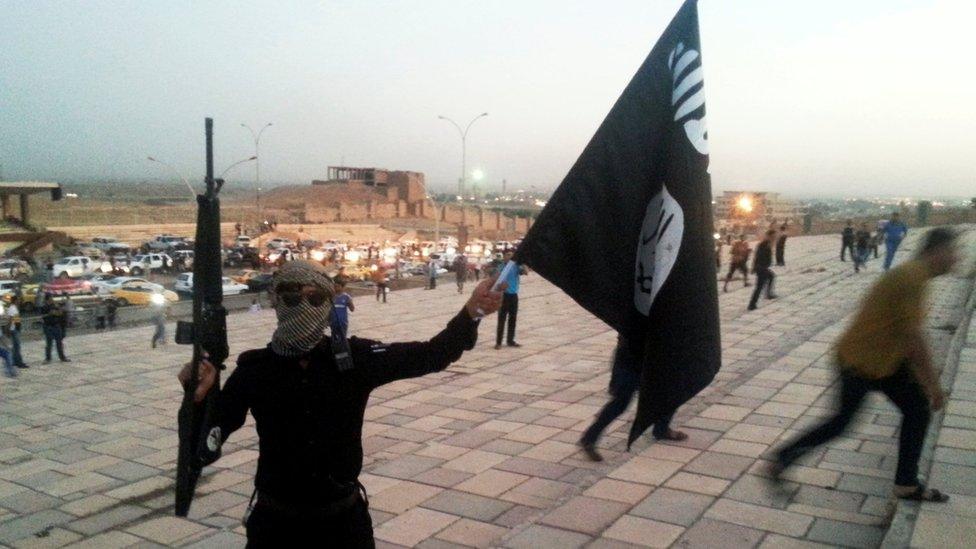Donald Trump blames Obama camp for 'Age of Terror'
- Published

Mr Trump tried to offer a more considered, reflective vision of has foreign policy plans - but there was still a place for the bizarre in his speech
It was a speech organised largely around one theme - the threat from radical Islam. So paradoxically, it was in this sense firmly within the existing US foreign policy mainstream.
This mainstream has elevated the threat from groups like so-called Islamic State and al-Qaeda into a phenomenon that requires nothing short of a "war against terror" in response.
The title of Mr Trump's speech referred to "the Age of Terror" no less.
As for other major "threats" to America's position in the world - a rising China, a more belligerent Russia, America's own failing economic competitiveness, or the cohesion of its own society - there was no mention.
Trump calls for 'extreme vetting' of immigrants to US
Who will be banned under Trump's immigration plan?
Trump v Clinton: Comparing their economic plans
Mr Trump was clear. His America would defeat "radical Islamic terrorism". And he repeated his assertion that the rise of self-styled Islamic State (Isis as he called it) was a direct result of the policy decisions made by President Barack Obama and his one-time Secretary of State Hillary Clinton.
To prove this assertion, Mr Trump relied upon a simple before-and-after comparison.
In 2009 before the Obama administration took over, Mr Trump argued: "Libya was stable; Syria was under control; Egypt was ruled by a secular ally of the United States. Iraq was experiencing a reduction of violence and Iran was being choked off by economic sanctions".
He contrasted this with today: "Libya is in ruins; Syria is in the midst of a disastrous civil war; in Egypt terrorists have gained a foothold in the Sinai desert; Iraq is in chaos and Isis is on the loose".
As a snapshot, this serves a purpose up to a point. But to hold the Obama administration responsible for the upheavals of the Arab Spring is surely pushing it a bit.

Should Barack Obama have done more to keep Egyptian strongman Hosni Mubarak in power?

Is Hillary Clinton responsible for the rise of the so-called Islamic State group?
Mr Obama is specifically criticised for not backing former President Hosni Mubarak of Egypt, and for his Cairo speech in 2009 when he sought to reset relations between the US and the Arab world.
Nobody would argue that there were no mistakes in US foreign policy towards the Middle East. The greatest of them came long before Mr Obama came to the Oval Office. But Mr Trump's condemnation seems curious in that it implicitly seems to suggest that there was a US remedy to the problems of the region, which if followed, would not have led us to where we are today.
As a political assault on his competitor in the race for the White House it may make good politics - Hillary Clinton in his view is responsible for the state of the Middle East, the rise of IS and so on.
But then Mr Trump goes on to say that if he becomes president "the era of nation-building will be ended".
So is he really proposing a "hands off" policy towards the region? For if he is, he is failing to understand the dynamics that have so hampered Mr Obama's efforts to disentangle himself from the Middle East's wars.
Bizarre
The tragedy if you like for America is that it is damned if it does and damned if it doesn't. Walking away altogether is simply not a feasible policy option.
There was still a place for the bizarre in Mr Trump's speech, however carefully scripted.
He asserted for example that the US "should have kept the oil in Iraq" - that US troops should have stayed in Iraq in sufficient numbers to safeguard the oil fields. The oil money could have been used, in his view, to fund the care of wounded soldiers and their families.
The fact that the Iraqi government for all its problems is an ally of the US seems to have passed him by and quite what the legal basis would be for holding on to Iraq's oil is anyone's guess.
On Nato, Mr Trump seems to have moderated his views, having in the past raised questions about its utility.
Since Mr Trump castigated the alliance it has, according to him, changed its policies and it now has a new division focused on terrorist threats. That of course is not Nato's core business.
But on the potential Russian threat to smaller Nato members or its destabilising activities in Ukraine or Georgia there was no mention. Indeed Russia is seen by Mr Trump as a potential ally in the fight against IS.
Contradictions
Mr Trump also sought to moderate his immigration control plans. The blanket ban on all Muslims entering the US seems to have gone. Instead there will be a temporary suspension of all immigration from certain countries, pending the introduction of a new ideological screening system.
This was a speech full of contradictions and, not surprisingly, orientated more to condemning his opponents.
But there was no real sign that Mr Trump understands the real world problems beyond America's shores.
This may not matter. He has already been abandoned by the best of the Republican-leaning foreign policy experts. And many of his voters will not see, let alone worry about, the inconsistencies in his positions.
Unlike many of Mr Trump's earlier foreign policy pronouncements this was a scripted speech - intended to be more considered and more reflective - a guide to what he might do in office.
The aim was both to differentiate his own plans from what he sees as the failed policies of the Obama/Clinton years, and to provide a veneer of realism to some of his wilder proposals.